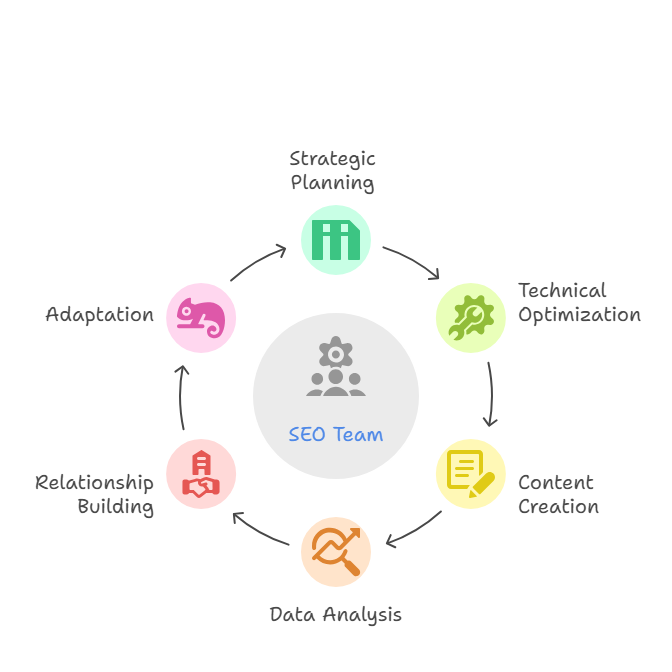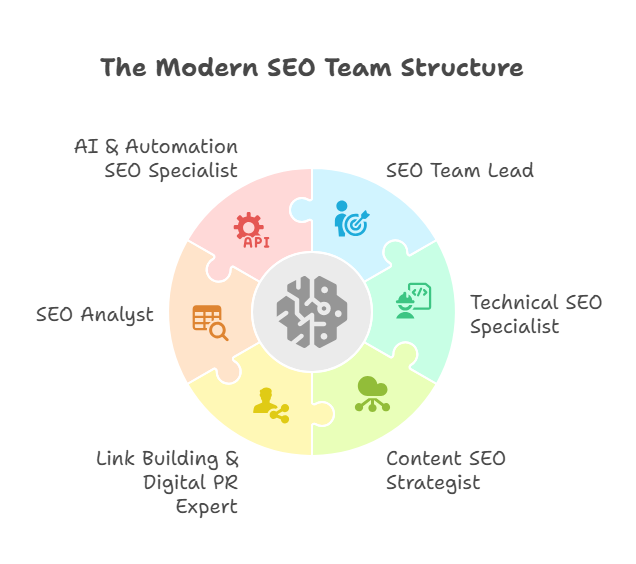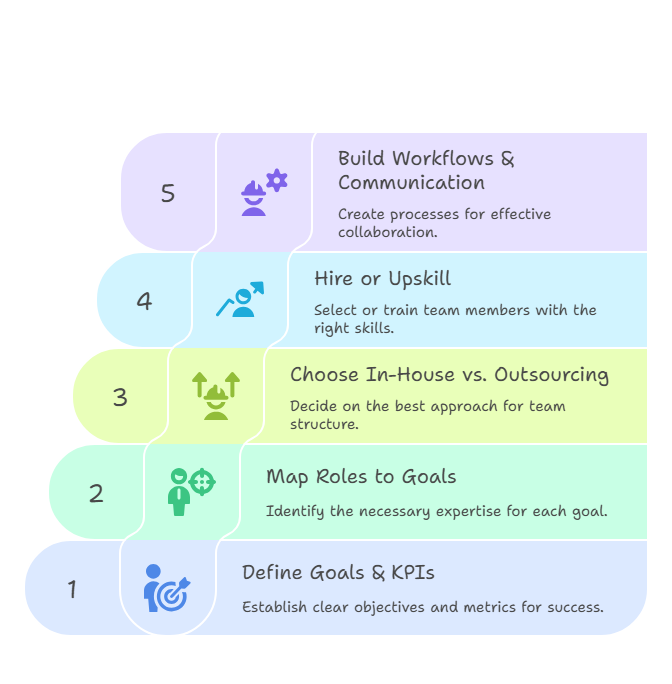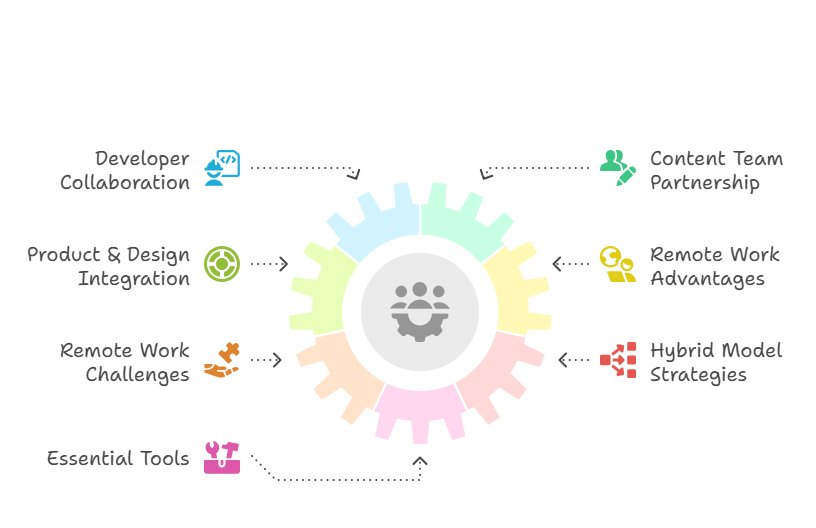Building a successful SEO team goes far beyond hiring people who understand keywords and backlinks. It requires assembling a powerhouse that can navigate Google’s ever-changing algorithms, leverage cutting-edge AI tools, and deliver measurable results that drive real business growth.
Whether you’re a startup looking to hire your first SEO specialist or an enterprise seeking to restructure your existing team, this comprehensive guide provides everything you need to build an SEO team that delivers exceptional results in 2025.
What Is an SEO Team?
An SEO team is a group of specialized professionals who collaborate to improve your website’s visibility in search engines. Think of them as your digital growth squad, where each member contributes unique skills that combine to create a traffic-generating machine.

What distinguishes a great SEO team from simply having someone who does SEO is the strategic combination of technical expertise, content strategy, data analysis, and relationship building working in perfect harmony. While a single person can wear multiple hats, a coordinated team can scale efforts and tackle complex challenges that would overwhelm any individual.
The most effective SEO teams don’t just optimize websites. They understand business objectives, collaborate across departments, and adapt quickly to industry changes. They serve as strategic partners who identify opportunities, solve problems, and execute campaigns that deliver measurable, sustainable results.
Why an SEO Team Is Critical for Long-Term Growth
SEO is no longer a set-it-and-forget-it strategy. Google implements thousands of algorithm updates annually, user behavior constantly evolves, and competitors continuously work to outrank you. Here’s why having a dedicated team makes all the difference:
SEO Directly Impacts Your Bottom Line
The numbers speak for themselves. SEO drives 53% of all website traffic, and businesses typically achieve a 14.6% close rate for SEO leads compared to just 1.7% for outbound marketing. When you have a team focused on improving search rankings, you’re building a revenue generator that operates around the clock.
A well-executed SEO strategy delivers:
- Organic traffic increases of 200-500% within the first year
- Customer acquisition cost reductions of up to 87% compared to paid advertising
- Lead conversion rates 8x better than traditional marketing methods
- Long-term brand authority that compounds over time
Teams Bring Scalability and Consistency
One person handling SEO might optimize 10 pages monthly. A coordinated team can optimize 100+ pages while simultaneously fixing technical issues, building relationships for backlinks, and analyzing performance data. This scalability separates businesses achieving modest SEO gains from those experiencing explosive growth.
Teams also provide consistency. When SEO efforts depend on one person, you’re vulnerable to knowledge gaps, burnout, and turnover. A team creates redundancy, shared knowledge, and standardized processes that maintain SEO momentum consistently.
Competitive Advantage Through Specialization
Companies with dedicated SEO teams consistently outperform those without them. While competitors juggle technical SEO, content creation, and link building as side tasks, your specialized team can excel in each area.
For example, while a generalist might spend 30 minutes on keyword research, a dedicated Content SEO Strategist can invest hours uncovering hidden opportunities, analyzing competitor gaps, and developing content clusters that dominate entire topic areas.
Core Roles in a Modern SEO Team
The most effective SEO teams in 2025 combine traditional SEO expertise with new skills in AI, automation, and advanced data analysis. Here are the essential roles that comprise a high-performing team:

1. SEO Team Lead / SEO Manager
The SEO Team Lead serves as your strategic quarterback. They don’t just manage people; they translate business goals into SEO strategies and ensure every team member’s work contributes to meaningful results.
Key Responsibilities:
- Develops comprehensive SEO strategies aligned with business objectives
- Sets and tracks KPIs including organic traffic growth, keyword rankings, and conversion rates
- Coordinates with other departments to implement SEO requirements
- Manages team performance and professional development
- Communicates SEO results and recommendations to executives and stakeholders
Exceptional SEO managers balance long-term strategy with short-term wins. They understand why fixing technical issues will pay dividends in six months while identifying quick content optimizations that boost traffic immediately.
2. Technical SEO Specialist
If your website can’t be crawled, indexed, or loaded quickly, all other SEO efforts become worthless. The Technical SEO Specialist ensures your site’s foundation is rock-solid.
Core Focus Areas:
- Site architecture and crawlability optimization
- Page speed improvements and Core Web Vitals optimization
- Schema markup implementation and structured data
- Mobile-first indexing and responsive design issues
- XML sitemaps, robots.txt, and canonicalization
- JavaScript SEO and single-page application optimization
Essential Tools:
- Screaming Frog: Comprehensive site audits and technical analysis
- Sitebulb: Visual crawl analysis and issue prioritization
- JetOctopus: Large-scale enterprise crawling capabilities
- Google PageSpeed Insights: Performance monitoring and optimization recommendations
The best Technical SEO Specialists communicate complex issues in simple terms and work effectively with developers to implement solutions rapidly.
3. Content SEO Strategist
Content remains king, but in 2025, it must be strategic, data-driven, and optimized for both users and search engines. The Content SEO Strategist bridges the gap between search intent and business communication needs.
Primary Responsibilities:
- Advanced keyword research using search intent analysis
- Content gap analysis to identify untapped opportunities
- Content calendar planning and editorial workflow management
- On-page optimization including title tags, meta descriptions, and internal linking
- E-E-A-T optimization for expertise, experience, authoritativeness, and trustworthiness
- Semantic SEO and topic cluster development
Modern Content SEO Strategists go beyond basic keyword targeting. They understand user intent, create content that answers real questions, and structure information in ways that both users and search engines appreciate.
4. Link Building & Digital PR Expert
Backlinks remain one of Google’s top ranking factors, but earning them requires relationship building, creative outreach, and strategic thinking. The Link Building & Digital PR Expert secures high-quality links that boost domain authority and drive referral traffic.
Key Activities:
- Prospect research and relationship building with relevant websites
- Creative campaign development including studies, surveys, and interactive content
- Broken link building and resource page outreach
- Digital PR campaigns that earn media coverage and natural links
- Competitor backlink analysis and gap identification
- Link portfolio monitoring and disavowal when necessary
Go-to Tools:
- Ahrefs: Backlink analysis and prospect research
- Pitchbox: Outreach campaign management and tracking
- BuzzStream: Relationship tracking and follow-up automation
- Hunter.io: Contact information discovery and verification
Successful link builders focus on building genuine relationships and creating value for outreach targets, not just sending templated emails requesting links.
5. SEO Analyst / Data Specialist
Data drives every decision in modern SEO. The SEO Analyst transforms raw numbers into actionable insights that guide strategy and demonstrate ROI.
Core Competencies:
- GA4 setup, configuration, and advanced reporting
- BigQuery for large-scale data analysis and custom queries
- Looker Studio dashboard creation and automated reporting
- Rank tracking and competitor performance monitoring
- Conversion tracking and attribution modeling
- Statistical analysis and trend identification
Great SEO Analysts don’t just report what happened; they explain why it happened and recommend what to do about it. They spot patterns, identify opportunities, and present data in ways that drive decision-making.
6. AI & Automation SEO Specialist (New Role for 2025)
This represents the newest and most exciting role in SEO teams. As AI tools become more sophisticated, specialists who integrate them effectively into SEO workflows provide massive competitive advantages.
Cutting-edge Responsibilities:
- AI tool integration for content creation, optimization, and analysis
- Python scripting for automated audits and reporting
- ChatGPT and Claude prompt engineering for SEO tasks
- Automated keyword clustering and content gap analysis
- Machine learning model development for ranking factor analysis
- Workflow automation using tools like Zapier and Make
AI & Automation Specialists help teams work 10x faster by automating repetitive tasks and using AI to enhance creative and analytical work. They don’t replace human expertise; they amplify it exponentially.
SEO Team Structures for Every Business Size
The optimal team structure depends on company size, budget, and SEO maturity. Here’s how to build effective teams at different scales:
Startup / Small Team (1-3 People)
When starting out, you need generalists who can wear multiple hats and deliver results quickly.
Recommended Structure:
- SEO Generalist/Manager: Handles strategy, content optimization, and team coordination
- Technical SEO/Content Hybrid: Splits time between technical fixes and content creation
- Freelance/Agency Support: Outsource specialized tasks like link building or advanced technical work
This structure works well for companies with 1-50 employees who need to establish SEO fundamentals quickly without excessive overhead.
Mid-Sized Company (4-8 People)
At this stage, you can begin specializing roles while maintaining flexibility.
Optimal Team Composition:
- SEO Manager: Strategy, team management, and stakeholder communication
- Technical SEO Specialist: Dedicated to site performance and technical optimization
- Content SEO Strategist: Keyword research, content planning, and on-page optimization
- SEO Analyst: Data analysis, reporting, and performance tracking
- Link Building Specialist: Either in-house or outsourced link acquisition
This structure enables deeper expertise in each area while maintaining coordination across all SEO disciplines.
Enterprise SEO Team (8+ People)
Large organizations require comprehensive teams that handle complex, multi-site SEO challenges.
Full-Scale Team Structure:
- SEO Director: High-level strategy and executive reporting
- Technical SEO Team: 2-3 specialists for different technical areas
- Content SEO Team: Multiple strategists handling different business units or regions
- Link Building & PR Team: In-house specialists plus agency partnerships
- SEO Analytics Team: Data analysts and reporting specialists
- AI & Automation Team: Developers and automation specialists
Enterprise teams often include sub-specializations like international SEO, local SEO, or ecommerce SEO depending on business requirements.
How to Build an Effective SEO Team from Scratch
Building an SEO team requires more than hiring people with SEO experience. Here’s a proven step-by-step approach:

Step 1: Define Your SEO Goals & KPIs
Before hiring anyone, get crystal clear on what success looks like. Your goals determine what roles you need and how to structure your team.
Common SEO Goals:
- Increase organic traffic by X% within 12 months
- Achieve page 1 rankings for high-value commercial keywords
- Improve conversion rates from organic traffic
- Expand into new geographic markets
- Build domain authority and brand recognition
Essential KPIs to Track:
- Organic traffic growth (total and by segment)
- Keyword ranking improvements and visibility
- Organic conversion rates and revenue attribution
- Backlink acquisition (quantity and quality metrics)
- Technical health scores including Core Web Vitals
Step 2: Map Goals to Required Roles
Different goals require different expertise. If your main challenge involves technical issues, hire a Technical SEO Specialist first. If you need more content, start with a Content SEO Strategist.
Goal-to-Role Mapping Examples:
- New website with technical issues: Technical SEO Specialist priority
- Established site needing traffic growth: Content SEO Strategist priority
- Low domain authority: Link Building Specialist priority
- Poor tracking and reporting: SEO Analyst priority
Step 3: Choose Between In-House vs. Outsourcing
In-House Advantages:
- Deep understanding of your business and industry
- Complete control over priorities and timelines
- Better integration with other departments
- Long-term commitment to your success
Outsourcing Benefits:
- Access to specialized expertise and advanced tools
- Lower initial costs and faster implementation
- Exposure to best practices from multiple industries
- Flexibility to scale up or down quickly
Many successful companies use hybrid approaches: in-house team for strategy and coordination, agencies or freelancers for specialized tasks like link building or technical implementation.
Step 4: Hire or Upskill Strategically
When hiring SEO professionals, look beyond technical knowledge. The best SEO team members are curious, analytical, and excellent communicators.
Key Qualities to Seek:
- Proven track record of delivering measurable results
- Ability to explain complex concepts in simple terms
- Experience with your industry or similar businesses
- Familiarity with modern tools and AI-powered workflows
- Growth mindset and willingness to learn continuously
Alternative to Hiring: Upskilling Existing Team Members
Sometimes your best SEO team members already work in your organization. Consider training people from marketing, content, or web development who demonstrate aptitude and interest in SEO.
Step 5: Build Seamless Workflows & Communication Loops
Even talented individuals won’t succeed without proper processes and communication. Establish clear workflows, regular check-ins, and shared accountability.
Essential Workflows to Establish:
- Weekly team sync meetings to discuss priorities and blockers
- Monthly strategy reviews with leadership and stakeholders
- Quarterly goal setting and performance evaluation
- Standardized reporting and documentation processes
- Cross-functional project management with other departments
How SEO Teams Collaborate Across Departments
SEO doesn’t operate in isolation. The most successful teams integrate seamlessly with other departments to implement changes quickly and effectively.

Working with Developers
Developers are your SEO team’s most important allies for implementing technical improvements. Building strong relationships here proves crucial.
Common Collaboration Areas:
- Site speed optimization and Core Web Vitals improvements
- Structured data implementation and schema markup
- URL structure changes and redirect management
- Mobile optimization and responsive design fixes
- JavaScript rendering and crawlability issues
Tips for Better Developer Collaboration:
- Provide clear, detailed specifications for requested changes
- Prioritize requests based on business impact, not just SEO benefit
- Learn basic development concepts and terminology
- Offer to QA and test implementations before going live
Partnering with Content Teams
Content teams create the material, but SEO teams ensure it gets discovered. This partnership proves essential for scalable content success.
Collaborative Activities:
- Editorial calendar planning based on keyword research insights
- Content brief creation with SEO requirements and guidelines
- On-page optimization of existing content assets
- Performance analysis to identify top-performing content types
- Content gap analysis to discover new topic opportunities
The key involves establishing processes where SEO insights inform content creation from the beginning, rather than optimizing content after publication.
Supporting Product & Design Teams
SEO considerations should be integrated into product development and design decisions, not added as afterthoughts.
Areas of Collaboration:
- Information architecture and site navigation design
- User experience optimization based on search behavior data
- Conversion rate optimization for organic traffic
- Product page optimization and category structure
- Internal linking strategies and site hierarchy
Remote, Hybrid, or In-House SEO Teams: What Works Best Now?
Work arrangements have fundamentally changed, and SEO teams have adapted remarkably well to remote and hybrid models. Here’s what we’ve learned:
Remote SEO Teams: The New Standard
Many SEO tasks are perfectly suited for remote work. Keyword research, content optimization, data analysis, and link outreach can all be performed effectively from anywhere.
Remote Work Advantages:
- Access to global talent pool and specialized experts
- Lower overhead costs and geographic flexibility
- Improved work-life balance leading to better retention
- 24/7 productivity with team members in different time zones
Remote Work Challenges:
- Communication gaps and delayed decision-making
- Difficulty building team culture and mentoring junior members
- Reduced collaboration on creative projects and brainstorming
- Potential security risks with distributed tool access
Hybrid Models: The Best of Both Worlds
Many successful SEO teams now use hybrid approaches, combining remote flexibility with strategic in-person collaboration.
Effective Hybrid Strategies:
- Monthly or quarterly in-person team meetings for strategy and planning
- Remote daily work with weekly video check-ins
- In-person collaboration for major projects or launches
- Flexible arrangements based on individual roles and preferences
Essential Tools for Managing Distributed SEO Teams
The right tools make all the difference in remote and hybrid team success:
Project Management:
- Asana: Task management and project tracking with SEO-specific templates
- Monday.com: Visual workflow management and team collaboration
- Notion: All-in-one workspace for documentation and knowledge sharing
Communication:
- Slack: Real-time messaging with channel organization by project or topic
- Zoom: Video meetings and screen sharing for collaborative work
- Loom: Asynchronous video communication for complex explanations
Documentation and Knowledge Sharing:
- Confluence: Centralized documentation and process management
- Google Workspace: Collaborative documents and real-time editing
- Miro: Visual collaboration for strategy mapping and brainstorming
Top SEO Tools Every Team Should Use in 2025
The right tools can make your SEO team 10x more effective. Here are the must-have tools for each area of SEO:
Keyword Research and Competitive Analysis
Ahrefs: The gold standard for backlink analysis, keyword research, and competitor intelligence. Their Content Gap tool is particularly powerful for finding untapped opportunities.
Semrush: Comprehensive SEO suite with strong keyword research, position tracking, and site audit capabilities. Excellent for local SEO and PPC integration.
LowFruits: Specialized tool for discovering low-competition, high-opportunity keywords that larger tools might miss.
Technical SEO Powerhouses
Screaming Frog: Desktop crawler essential for technical audits. Can crawl up to 500 URLs for free, with unlimited crawling in the paid version.
Sitebulb: Visual website crawler that presents technical issues in easy-to-understand formats. Great for communicating technical problems to non-technical stakeholders.
GTmetrix: Page speed analysis with actionable recommendations and historical tracking.
Content Optimization and Creation
Frase: AI-powered content optimization that analyzes top-ranking pages and provides detailed content briefs.
SurferSEO: Real-time content editor that provides optimization suggestions as you write.
Clearscope: Content optimization platform that helps create comprehensive, semantically-rich content.
Analytics and Reporting
Google Analytics 4: Essential for tracking user behavior, conversions, and attribution.
BigQuery: Advanced data analysis and combining multiple data sources.
Looker Studio: Free dashboard creation tool that connects to multiple data sources.
AI and Automation Tools
ChatGPT Plus: Content ideation, meta tag creation, and complex data analysis.
Python: Programming language for custom automations and data processing.
Zapier: No-code automation platform for connecting SEO tools and workflows.
Final Thoughts: What Makes a Great SEO Team?
After analyzing hundreds of successful SEO teams, three factors consistently separate the exceptional ones from the merely good ones:
Crystal Clear Goals and KPIs
Great SEO teams know exactly what success looks like and how their work contributes to business objectives. They don’t just track rankings and traffic; they measure revenue, conversions, and long-term brand value. Every team member understands how their daily work connects to these bigger goals.
The Perfect Balance of Strategy, Execution, and Analysis
Successful teams don’t just perform SEO tasks; they think strategically about SEO. They balance long-term planning with tactical execution, and they use data to guide every decision. They’re not afraid to experiment, but they measure everything and learn from both successes and failures.
Adaptability in the Age of AI and Algorithm Changes
The SEO landscape changes constantly, and great teams embrace change rather than resist it. They’re early adopters of new tools and techniques, they stay informed about industry developments, and they’re always testing new approaches. Most importantly, they understand that AI and automation amplify human expertise rather than replace it.
Building an SEO team isn’t just about hiring people with the right skills; it’s about creating a culture of growth, learning, and results. The teams that succeed in 2025 and beyond will be those that combine deep SEO expertise with strategic thinking, collaborative skills, and the ability to leverage new technologies effectively.
Remember, your SEO team is an investment in your company’s long-term growth. The organic traffic, brand authority, and customer relationships you build through effective SEO compound over time, creating sustainable competitive advantages that paid advertising simply cannot match.
FAQs About Building an SEO Team
How many people should be on an SEO team?
The ideal SEO team size depends on your company size, budget, and SEO goals. Here’s a general guideline:
- Small businesses (under $5M revenue): 1-2 people, often generalists or hybrid roles
- Mid-sized companies ($5M-$50M revenue): 3-5 people with some specialization
- Large enterprises ($50M+ revenue): 6+ people with deep specialization and sub-teams
Quality matters more than quantity. A well-coordinated team of 3 specialists will outperform 6 generalists consistently. Focus on acquiring the right skills for your specific challenges rather than reaching a particular team size.
Can I outsource parts of my SEO team?
Absolutely, and many successful companies use hybrid approaches. Common outsourcing arrangements include:
- Link building: Often outsourced due to specialized relationship requirements
- Technical implementation: Development agencies can handle complex technical SEO work
- Content creation: Freelance writers with SEO knowledge can scale content production
- Specialized audits: Bring in experts for specific projects like international SEO or technical overhauls
Keep strategy, analysis, and coordination in-house while outsourcing execution-heavy tasks. This gives you control over direction while accessing specialized expertise as needed.
What’s the first role I should hire for?
Your first hire should address your biggest constraint:
- If you have technical issues: Start with a Technical SEO Specialist
- If you need more content: Hire a Content SEO Strategist first
- If you lack overall strategy: Begin with an SEO Manager or experienced generalist
- If you can’t measure results: An SEO Analyst might be your priority
For most companies, an experienced SEO Manager or strong generalist is the best first hire because they can identify and prioritize your most critical needs while building the foundation for future team growth.
Do SEO teams need developers?
SEO teams don’t necessarily need full-time developers, but they absolutely need reliable access to development resources. Technical SEO improvements often require code changes, and implementation speed directly impacts results.
Options include:
- In-house developers: Ideal for large companies with significant technical SEO needs
- Shared development resources: SEO team gets allocated time from existing dev team
- SEO specialists with coding skills: Technical SEO specialists who can implement basic changes
- Development agencies: Outsourced technical implementation for specific projects
The key is ensuring your SEO team can get technical changes implemented quickly without getting stuck in long development queues.


